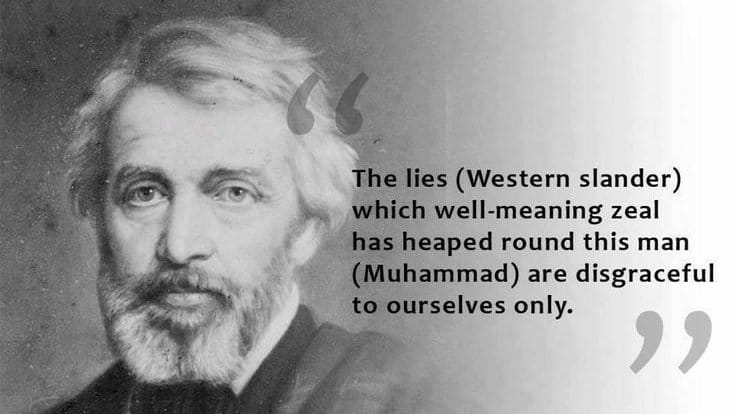Thomas Carlyle and the Prophet Muhammad (ﷺ)

In surveying the positive opinions on Islam by great men and cultural figures of the West, we would be sorely remiss to leave out such a luminary as the celebrated Victorian-era Scottish essayist, historian, and philosopher Thomas Carlyle.
Carlyle had a profound influence on 19th-century art, literature, and philosophy. One of his greatest works entitled On Heroes, Hero-Worship, & the Heroic in History featured an entire essay (based on a talk he had given) extoling the life and virtues of the Prophet Muhammad (ﷺ). In his lecture entitled “The Hero as Prophet”, Carlyle outlined Muhammad (ﷺ) as a Hegelian agent of reform, insisting on his sincerity and commenting “how one man single-handedly, could weld warring tribes and wandering Bedouins into a most powerful and civilized nation in less than two decades”. His interpretation has been widely cited by Muslim scholars to show Muhammad without orientalist bias.
Carlyle advocated a ‘Great Men’ theory of history, in which great and heroic figures lead the way in shaping civilization and history. It was a sort of ‘heroic vitalism’ in which the hero was somewhat similar to Aristotle’s “magnanimous” man — a person who flourished in the fullest sense. And for Carlyle, part of their heroism lay in their creative energy in the face of these complexities and difficulties of life in this world.
There is perhaps no person in the 19th century who so famously praised the life and character of the Prophet Muhammad (ﷺ) as Thomas Carlyle. Of the Prophet (ﷺ), Carlyle said:
It is a great shame for anyone to listen to the accusation that Islam is a lie and that Muhammad was a fabricator and a deceiver. We saw that he remained steadfast upon his principles, with firm determination; kind and generous, compassionate, pious, virtuous, with real manhood, hardworking and sincere. Besides all these qualities, he was lenient with others, tolerant, kind, cheerful and praiseworthy and perhaps he would joke and tease his companions. He was just, truthful, smart, pure, magnanimous and present-minded; his face was radiant as if he had lights within him to illuminate the darkest of nights; he was a great man by nature who was not educated in a school nor nurtured by a teacher as he was not in need of any of this. [From The Hero as Prophet.]
You can read the entirety of Carlyle’s essay here. (Or, you can listen to it on Youtube, which is where I first heard it while I was herding goats in the mountains of Northern California.)
Carlyle’s Victorian-era reading of Islam and of Muhammad (ﷺ) is not without its own flaws and criticisms — and even problematic elements. However, his work marked a significant movement away from ancient, Christian biases and negative depictions of Muhammad (ﷺ) and towards something more positive. In his work, Carlyle sums up what he saw as the prevailing attitude of his time:
Our current hypothesis about Mahomet, that he was a scheming Impostor, a Falsehood incarnate, that his religion is a mere mass of quackery and fatuity, begins really to be now untenable to any one. The lies, which well-meaning zeal has heaped round this man, are disgraceful to ourselves only . . . The word this man spoke has been the life-guidance now of a hundred and eighty millions of men these twelve hundred years. These hundred and eighty millions were made by God as well as we . . . Are we to suppose that it was a miserable piece of spiritual legerdemain, this which so many creatures of the Almighty have lived by and died by? I, for my part, cannot form any such supposition . . . One would be entirely at a loss what to think of this world at all, if quackery so grew and were sanctioned here . . . more godless theory, I think, was never promulgated in this Earth. A false man found a religion? Why, a false man cannot build a brick house! . . . it will fall straightway. [From The Hero as Prophet.]
To the many who read and adored Carlyle in his time, his words on the Prophet Muhammad made a great impact — and still do to this day. It was said, for example, that Mahatma Gandhi read “The Hero as Prophet” in his studies of Islam and “learnt of the Prophet’s greatness and bravery and austere living.” (He speaks of this in his famous autobiography.)
Too often our own contemporary view of the Prophet Muhammad (ﷺ) is tainted by the politics and propaganda of our time. It would do us well to go back and re-read these ‘great men’ of history and of culture — men such as Carlyle, Tolstoy, and Goethe — to hear what they have to say. For “if we can see further, it is because we are standing on the shoulders of giants”.
If you like this content, please consider a small donation via PayPal or Venmo. I am currently studying Islam and Arabic full-time with no income, and any donation — however small! — will greatly help me to continue my studies and my work. Please feel free to reach me at saidheagy@gmail.com.
Thank you, and may God reward you! Glory to God for all things!